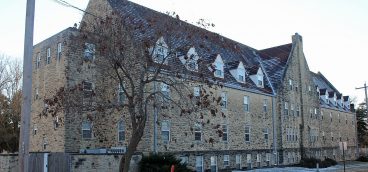The Flinty Vermonter

I had left the repair of the Trombley barn’s floor for last because it seemed as if it would be the simplest part of the job. I was way wrong. More of the joists were rotten than I had anticipated, and the work mostly had to be done while standing in the barn’s disgusting basement.
Previously in this series: The Hole that Swallowed Eddie
We only worked on Sundays, but the days when I worked on replacing the barn floor I always got back to VA looking and smelling so loathsome I sometimes had to burn my clothes.
But finally we finished all the painting and repairing – except for the back of the barn, of course, which we had to leave as-is. You might think the Widow Trombley would be appreciative of the work we’d done, painting and fixing up her barn for free, even if the work hadn’t been exactly perfect.
But when I knocked on her back door to let her know we were finished with the work and wouldn’t be returning, she said, “You ain’t done the back, so you ain’t done.”
But whether the widow liked it or not, we were done. But then, over the next few weeks, we learned that the Widow Trombley had been bad-mouthing VA all over the Northeast Kingdom, telling people what a lousy job we’d done, what a mess we’d made, how noisy the kids had been, how somebody should shut VA down.
I was beside myself with annoyance and I wasn’t shy about pointing out to Rich Bolotin that this outcome was the exact opposite of what he’d hoped to accomplish with his “charm offensive.” And although I didn’t say so outright, as far as I was concerned it served him right.
But then something unexpected happened. A farmer and his wife – friends of the widow – decided to drive over to the Trombley place and see what sort of a mess VA’d made of the barn. They came up the long farm lane that served as a driveway, then pulled around the Trombley house to where the barn sat on higher ground.
We’d painted the barn white and it faced south, and now the sun reflected blindingly off the façade. To the astonishment of the farmer and his wife, the place looked less like a messed-up barn and more like a magical castle on the hill. Of course, they then drove around back and saw that the north side of the barn was its old rundown self.
It didn’t take long for the locals to dub the place “The barn with the Queen Anne front and the Mary Ann behind,” and for a few weeks the place became a local tourist attraction.
Especially on Sundays, cars and pickup trucks could be seen driving up the Widow Trombley’s lane and pulling around behind the house, the occupants staring at the amazing south side of the barn, glowing brilliantly in the sun and looking brand new. Then they’d drive around to the back of the barn and sit laughing at the dilapidated condition of that side. The Widow Trombley sat in her rocking chair on the front porch and waved to everyone as they came and went.
Whatever the widow thought of VA’s handiwork, other farmers liked it and several of them called Rich Bolotin to ask if VA would repair and paint their barns – assuming the farmers would provide the paint and materials. I could see that Rich was seriously considering these proposals, and I was seriously considering murdering him in his bed.
But then I was bailed out by a bit of good old-fashioned crony capitalism. A couple of construction companies got wind of what was going on and they complained to the Orleans County Commissioners.
The Commission chairman then sent Rich a carefully worded letter that congratulated him on VA’s “famous” work on the Trombley barn. But the letter also pointed out that many county residents (he didn’t bother mentioning that they were voters and campaign donors) made their living repairing barns and that it would be very difficult for them to compete with a competitor who was working for free.
The letter, in other words, was an iron fist in a velvet glove that basically told Rich to butt out. Rich got the message and butted out.
Nearly a month after we’d finished with the barn I was still annoyed by that ingrate, the Widow Trombley. Not only had she never thanked us for the (free) work we did on her barn and that had made it and her local celebrities, she’d actually chewed me out for not painting the back of the place.
I told Meg Petronius that I was harboring fantasies of sneaking out to the barn in the middle of the night with a barrel of paint remover and restoring it to its original dilapidated condition.
Meg told me I just didn’t understand Vermonters and that their crusty and taciturn manner often hid a “heart of gold.” I suggested to Meg that the Widow Trombley’s “heart of gold” hid an inner core of sheer nastiness.
But one day a strange car pulled into VA’s parking lot and a lady got out I’d never seen before. She carried several white boxes into VA’s kitchen that turned out to contain four dozen homemade doughnuts, half of them frosted with powdered sugar.
“Mrs. Trombley,” she told me, “just remembered that she’d forgotten to thank VA for all the work you did on her barn, so she made these doughnuts for you.” The lady also told me that Mrs. Trombley was “renowned across the Kingdom” for her homemade doughnuts.
Since the kids were still in school, and since Meg was upstairs in her bedroom and Rich was who-knew-where, I took upon myself the burden of determining whether the Widow Trombley’s doughnut-making reputation was deserved. After eating only 12 doughnuts, I concluded that all was forgiven.
Next up: VA, Part 10











